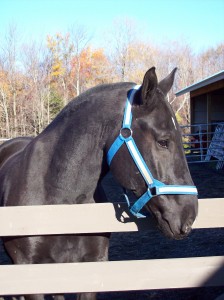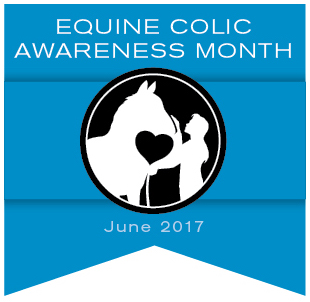Author: Ann Egan, North Point Farm
 We bought “Wyatt”, a six year old Percheron gelding in late October of 2007, along with his teammate, “Tucker”. When he got to the farm, he settled in nicely and seemed to enjoy his new home and surroundings. Little did we know that he dribbled his grain onto his stall floor and, in his haste to gather it all up he was eating his bedding too.
We bought “Wyatt”, a six year old Percheron gelding in late October of 2007, along with his teammate, “Tucker”. When he got to the farm, he settled in nicely and seemed to enjoy his new home and surroundings. Little did we know that he dribbled his grain onto his stall floor and, in his haste to gather it all up he was eating his bedding too.
Three days after he arrived, he started exhibiting some signs of colic yet, he was still passing manure. It was a bit confusing for us as, he had been seen by the farrier for a trim and was eating well. He had also done some light work in harness without complaint as well as passing the aforementioned manure the day of his official diagnosis.
As the day progressed, we decided to call the vet as, the horses need to be seen since they were new and, we couldn’t shake the nagging feeling that something was wrong with Wyatt. We called the vet and she came out to the farm and after a quick rectal exam, she told us that he had impaction colic. She said that he could stay at the farm and we could try and manage it with fluids or she could admit him to the local large animal hospital. We choose the latter option and off he went.
We had the discussion that everyone has when their horse colics, is the cost worth it and more importantly, can we afford it?
We felt that Wyatt deserved a shot so we gave the go-ahead for the surgery but first the staff at the hospital told us that they would try and manage Wyatt’s colic by other means that were less invasive. Unfortunately, Wyatt would need surgery less than 24 hours after he was admitted.
The surgery was performed the next day after a night of the hospital staff trying to manage the colic with fluids and oil. Wyatt’s labs concerning his kidneys were showing the strain so he was taken to surgery. Little did we know that colic surgery can be risky, even more so for a draft horse.
Nonetheless, the next day Wyatt was up and doing well. The staff said he was a model patient. The veterinary surgeon reported that Wyatt had what amounted to a trash can full of shavings in his intestine. (A side note: we had been using Nafcor bedding, which has since been taken off the market. It resembled feed pellets and this may have confused Wyatt who then ate them.) Wyatt stayed at the hospital for two days and we visited him, noting that he seemed calm and settled.
What we didn’t know then that we know now is that Draft horses are uncommonly stoic. They really don’t complain when something is off. This was definitely the case with Wyatt. His ability to pass manure was also puzzling given that this was impaction colic.
Wyatt is now ten years old, living in Vermont, and there have been no other instances of colic for him. The cost of his surgery could have funded the purchase of a small car but in the end it was worth it.
Our management style changed after experiencing our first bout of colic requiring surgery. We always make sure to sweep out around and under the feed buckets when it is feeding time. We have changed the bedding that we use to wood shavings. We also know that these horses, because if their nature, must be watched carefully and we take quick action for anyone who looks as though they may have a belly ache.
Luckily things turned out well for Wyatt and we have not had to return to the clinic with another case of colic!






